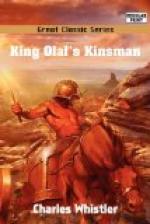Long did those two warriors talk before they turned to lighter matters, and in the end they planned to ride to Rouen to see the king himself on the next day. But before night fell there came more news with another ship that came alone into the haven. And she was English, bearing messengers from the great witan itself.
These thanes told Eadmund their news, and it was this:
That Cnut had been hailed as king by the Danish host at Gainsborough, but that the English people begged Ethelred to return to them, promising that a good force should be ready to meet him on his landing. Already the London folk had planned a rising there and in the great towns against the Thingmen, as the Danish paid garrisons were called, and it was likely that this had by this time come about.
So at once Eadmund went with these thanes to Rouen, and Olaf would have me bide with him till word came from the king as to the next doings.
That was a pleasant time to me, for I grew to love Olaf, and he was never willing that I should be far from him. Then, too, I heard many tales of my grandfather Thoralf from Rani, the old viking who had fought beside him, and had been with Tryggvesson when he was christened in England. And of all Olaf’s men I liked best Ottar the Black, the scald, who was but five years older than myself, but who had yet seen much fighting with the king both by land and sea. We sang much together, for I was willing to learn from him, and he to teach me.
Now of this singing there is one thing that I will set down, for the matter comes into my story again.
One day Ottar sang the saga of the sword of Hiorvard; how the maiden warrior won it from the grave mound of her father, Angantyr, in spite of terror of the dead hero, and of the unearthly fires. That was a good saga, and when it was ended old Rani said:
“Thoralf had a sword that was won by his father from a chief’s grave mound in Vendland, It was the most wondrous sword, save only Olaf’s ‘Hneitir’ yonder, that I have ever seen. Silver and gold was its hilt, and the blade was wrought in patterns on the steel, and there were runes in gold close to the hilt. He would call it ’Foe’s Bane’, and that in truth was what the sword was.”
I knew only too well that that sword became my father’s in his turn, and now it was lost to me.
“My father fell with sword ‘Foe’s Bane’ in his hand,” I said sadly. “Yet I know that the name was not belied ere he did so.”
“Then the Danes have it,” said Rani, “and it will come back to you.”
I remembered that Ethelred himself had spoken of the sword, and how I had made his face fall when he heard that it was lost. Nor had I been long at court before I heard words from one thane or another that seemed to say that Edric Streone had made light of our defeat, for some reasons of his own.
“I must win it back,” I said.
“If there is aught in old sayings,” answered Ottar, “the sword will draw its holder to face you, unless he won it in fair fight hand to hand.”




